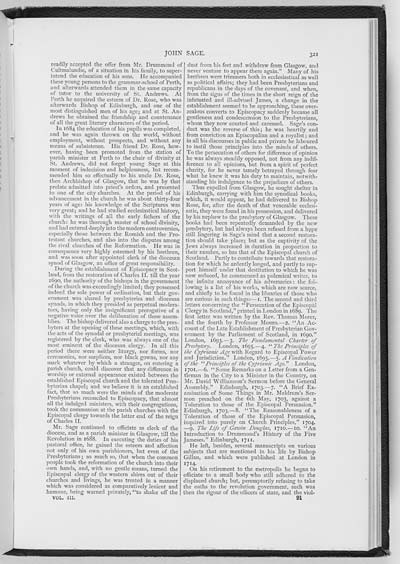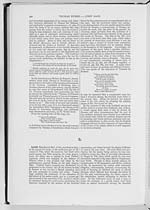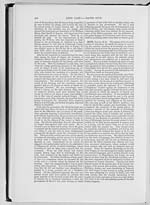321
readily accepted the offer from Mr. Drummond of
Cultmalundie, of a situation in his family, to super-
intend the education of his sons. He accompanied
these young persons to the grammar-school of Perth,
and afterwards attended them in the same capacity
of tutor to the university of St. Andrews. At
Perth he acquired the esteem of Dr. Rose, who was
afterwards Bishop of Edinburgh, and one of the
most distinguished men of his age; and at St. An-
drews he obtained the friendship and countenance
of all the great literary characters of the period.
In 1684 the education of his pupils was completed,
and he was again thrown on the world, without
employment, without prospects, and without any
means of subsistence. His friend Dr. Rose, how-
ever, having been promoted from the station of
parish minister at Perth to the chair of divinity at
St. Andrews, did not forget young Sage at this
moment of indecision and helplessness, but recom-
mended him so effectually to his uncle Dr. Rose,
then Archbishop of Glasgow, that he was by that
prelate admitted into priest's orders, and presented
to one of the city churches. At the period of his
advancement in the church he was about thirty-four
years of age: his knowledge of the Scriptures was
very great; and he had studied ecclesiastical history,
with the writings of all the early fathers of the
church: he was thorough master of school divinity,
and had entered deeply into the modern controversies,
especially those between the Romish and the Pro-
testant churches, and also into the disputes among
the rival churches of the Reformation. He was in
consequence very highly esteemed by his brethren,
and was soon after appointed clerk of the diocesan
synod of Glasgow, an office of great responsibility.
During the establishment of Episcopacy in Scot-
land, from the restoration of Charles II. till the year
1690, the authority of the bishops in the government
of the church was exceedingly limited; they possessed
indeed the sole power of ordination, but their gov-
ernment was shared by presbyteries and diocesan
synods, in which they presided as perpetual modera-
tors, having only the insignificant prerogative of a
negative voice over the deliberation of these assem-
blies. The bishop delivered also a charge to the pres-
byters at the opening of these meetings, which, with
the acts of the synodal or presbyterial meetings, was
registered by the clerk, who was always one of the
most eminent of the diocesan clergy. In all this
period there were neither liturgy, nor forms, nor
ceremonies, nor surplices, nor black gowns, nor any
mark whatever by which a stranger, on entering a
parish church, could discover that any difference in
worship or external appearance existed between the
established Episcopal church and the tolerated Pres-
byterian chapel; and we believe it is an established
fact, that so much were the minds of the moderate
Presbyterians reconciled to Episcopacy, that almost
all the indulged ministers, with their congregations,
took the communion at the parish churches with the
Episcopal clergy towards the latter end of the reign
of Charles II.
Mr. Sage continued to officiate as clerk of the
diocese, and as a parish minister in Glasgow, till the
Revolution in 1688. In executing the duties of his
pastoral office, he gained the esteem and affection
not only of his own parishioners, but even of the
Presbyterians; so much so, that when the common
people took the reformation of the church into their
own hands, and, with no gentle means, turned the
Episcopal clergy of the western shires out of their
churches and livings, he was treated in a manner
which was considered as comparatively lenient and
humane, being warned privately, "to shake off the
VOL. III.
dust from his feet and withdraw from Glasgow, and
never venture to appear there again." Many of his
brethren were trimmers both in ecclesiastical as well
as political affairs; they had been Presbyterians and
republicans in the days of the covenant, and when,
from the signs of the times in the short reign of the
infatuated and ill-advised James, a change in the
establishment seemed to be approaching, these over-
zealous converts to Episcopacy suddenly became all
gentleness and condescension to the Presbyterians,
whom they now courted and caressed. Sage's con-
duct was the reverse of this; he was heartily and
from conviction an Episcopalian and a royalist; and
in all his discourses in public and private he laboured
to instil those principles into the minds of others.
To the persecution of others for difference of opinion
he was always steadily opposed, not from any indif-
ference to all opinions, but from a spirit of perfect
charity, for he never tamely betrayed through fear
what he knew it was his duty to maintain, notwith-
standing his indulgence to the prejudices of others.
Thus expelled from Glasgow, he sought shelter in
Edinburgh, carrying with him the synodical books,
which, it would appear, he had delivered to Bishop
Rose, for, after the death of that venerable ecclesi-
astic, they were found in his possession, and delivered
by his nephew to the presbytery of Glasgow. These
books had been repeatedly demanded by the new
presbytery, but had always been refused from a hope
still lingering in Sage's mind that a second restora-
tion should take place; but as the captivity of the
Jews always increased in duration in proportion to
their number, so has that of the Episcopal church of
Scotland. Partly to contribute towards that restora-
tion for which he ardently longed, and partly to sup-
port himself under that destitution to which he was
now reduced, he commenced as polemical writer, to
the infinite annoyance of his adversaries: the fol-
lowing is a list of his works, which are now scarce,
and chiefly to be found in the libraries of those who
are curious in such things:�I. The second and third
letters concerning the " Persecution of the Episcopal
Clergy in Scotland," printed in London in 1689. The
first letter was written by the Rev. Thomas Merer,
and the fourth by Professor Monro.�2. "An Ac-
count of the Late Establishment of Presbyterian Gov-
ernment by the Parliament of Scotland, in 1690."
London, 1693.�3. The Fundamental Charter of
Presbytery. London, 1695.�4. " The Principles of
the Cyprianic Age with Regard to Episcopal Power
and Jurisdiction." London, 1695.�5. A Vindication
of the "Principles of the Cyprianic Age." London,
1701.�6. "Some Remarks on a Letter from a Gen-
tleman in the City to a Minister in the Country, on
Mr. David'Williamson's Sermon before the General
Assembly." Edinburgh, 1703.�7. "A Brief Ex-
amination of Some Things in Mr. Meldrum's Ser-
mon preached on the 6th May, 1703, against a
Toleration to those of the Episcopal Persuasion."
Edinburgh, 1703.�8. "The Reasonableness of a
Toleration of those of the Episcopal Persuasion,
inquired into purely on Church Principles," 1704.
�9. The Life of Gawin Douglas, 1710.�10. "An
Introduction to Drummond's History of the Five
Jameses." Edinburgh, 1711.
He left, besides, several manuscripts on various
subjects that are mentioned in his life by Bishop
Gillan, and which were published at London in
1714.
On his retirement to the metropolis he began to
officiate to a small body who still adhered to the
displaced church; but, peremptorily refusing to take
the oaths to the revolution government, such was
then the rigour of the officers of state, and the viol-
91

![]() Universal Viewer |
Universal Viewer | ![]() Mirador |
Large image | Transcription
Mirador |
Large image | Transcription
![]()

